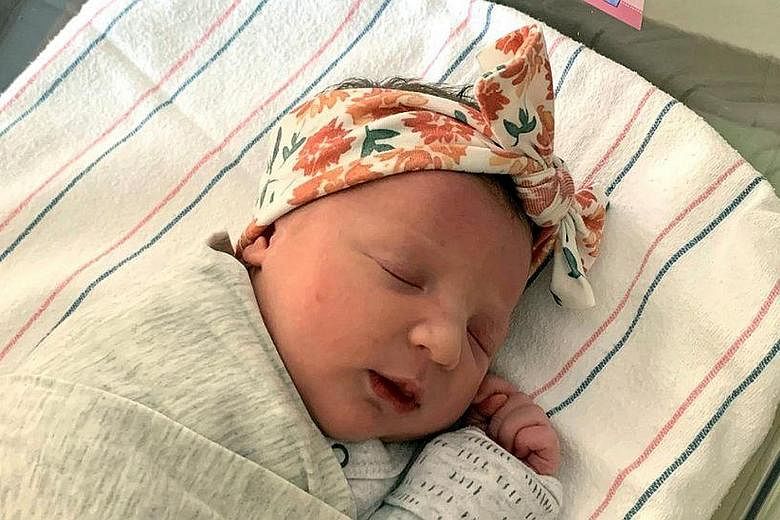NASHVILLE • In 1992, when Tina Gibson was nearly two years old, a couple donated embryos which were then frozen in a clinic in the Midwest.
In February this year, one of those embryos was implanted in Ms Gibson, now a teacher in Knoxville, Tennessee. In October, she gave birth to a 3.09kg baby whom Ms Gibson and her husband, Ben, named Molly.
The birth broke the record for the longest-frozen embryo to result in a live birth.
That record, according to the National Embryo Donation Centre in Tennessee, was set in 2017, when Molly's older sister, Emma, was born after an embryo from the same donor couple was implanted in Ms Gibson.
"We feel so blessed that God so long ago decided this was going to be our family," Ms Gibson said. "I can't imagine having any other kids but these kids. They're just meant to be ours."
Molly's birth is the result of a process that began when an embryo was frozen on Oct 14, 1992. It was thawed in February this year, said Ms Martha Earl, director of the University of Tennessee Preston Medical Library.
She said she had researched medical journal articles and had "found no published case in a medical journal of a live birth" of an embryo that had been frozen for more than 20 years.
Molly's birth shows that there is not a limited length of time an embryo can be frozen, even though freezing techniques have changed significantly since the 1990s, said Dr Jeffrey Keenan, director of the National Embryo Donation Centre, a Christian organisation that performed the transfers.
"If the embryo survives the thaw well, it should have just as good a chance as a freshly created embryo," he said.
"No embryo is too old."
The birth is an exciting development that will allow fertility doctors to reassure prospective parents that an embryo frozen for years, even decades, will remain viable, said Dr Mindy Christianson, medical director at the Johns Hopkins Fertility Centre.
"Patients often ask how long can embryos be frozen," she said. "Often, the answer is, 'We don't really know.' Now we can say with confidence there have been babies born from embryos that have been frozen for 27 years."
Dr Sigal Klipstein, director of the egg donor programme at InVia Fertility Specialists in Chicago, said that the length of time an embryo spends frozen is not an important data point for fertility doctors.
"The issue is the quality of the embryo at the time of freezing," she said. "If it's a good quality embryo, we anticipate that it will remain a good quality embryo at the timing of the freezing and at the timing of the thaw."
Ms Gibson said she and her husband had decided to use donated embryos after seeing a news story about a woman who had tried to get pregnant the same way.
The Gibsons had struggled for five years to adopt a child, but the process was riddled with setbacks.
They were hesitant to pursue in vitro fertilisation because Ben, 36, has cystic fibrosis, and his wife, 29, learnt she was a carrier. Ms Gibson said they feared passing the condition on to their children.
When they began researching donor embryos at the donation centre, they learnt about the donor parents' ages, physical characteristics, educational and medical backgrounds and even hobbies. The ages of the embryos were not listed.
Ms Gibson said she had been nervous about that at first but had felt better after Dr Keenan told her it would make no difference to the babies' health. "Both pregnancies went smoothly," she said. "Both are perfectly healthy."
NYTIMES

